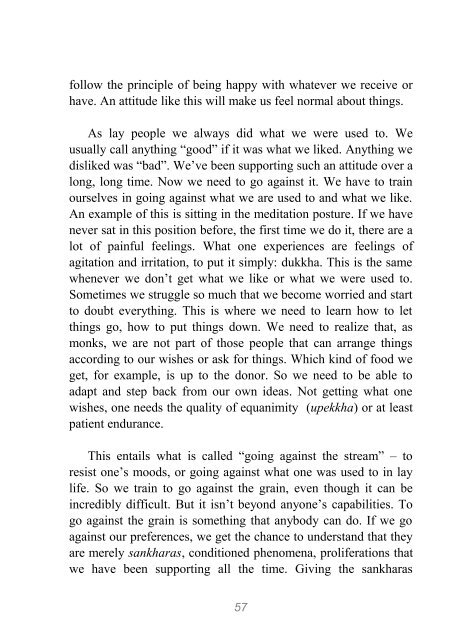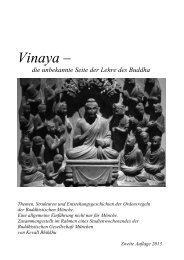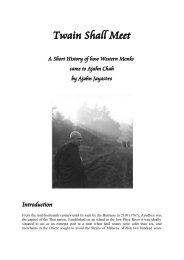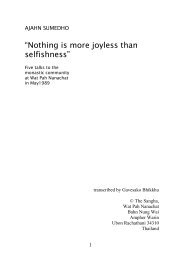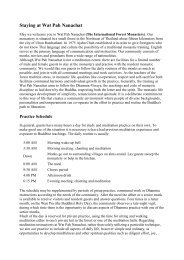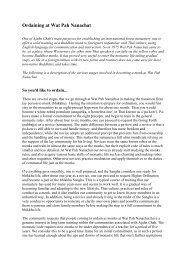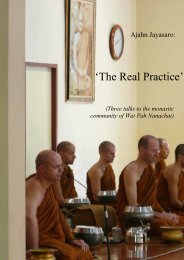Luang Por Liem: The Ways of the Peaceful - Wat Pah Nanachat
Luang Por Liem: The Ways of the Peaceful - Wat Pah Nanachat
Luang Por Liem: The Ways of the Peaceful - Wat Pah Nanachat
You also want an ePaper? Increase the reach of your titles
YUMPU automatically turns print PDFs into web optimized ePapers that Google loves.
follow <strong>the</strong> principle <strong>of</strong> being happy with whatever we receive or<br />
have. An attitude like this will make us feel normal about things.<br />
As lay people we always did what we were used to. We<br />
usually call anything “good” if it was what we liked. Anything we<br />
disliked was “bad”. We’ve been supporting such an attitude over a<br />
long, long time. Now we need to go against it. We have to train<br />
ourselves in going against what we are used to and what we like.<br />
An example <strong>of</strong> this is sitting in <strong>the</strong> meditation posture. If we have<br />
never sat in this position before, <strong>the</strong> first time we do it, <strong>the</strong>re are a<br />
lot <strong>of</strong> painful feelings. What one experiences are feelings <strong>of</strong><br />
agitation and irritation, to put it simply: dukkha. This is <strong>the</strong> same<br />
whenever we don’t get what we like or what we were used to.<br />
Sometimes we struggle so much that we become worried and start<br />
to doubt everything. This is where we need to learn how to let<br />
things go, how to put things down. We need to realize that, as<br />
monks, we are not part <strong>of</strong> those people that can arrange things<br />
according to our wishes or ask for things. Which kind <strong>of</strong> food we<br />
get, for example, is up to <strong>the</strong> donor. So we need to be able to<br />
adapt and step back from our own ideas. Not getting what one<br />
wishes, one needs <strong>the</strong> quality <strong>of</strong> equanimity (upekkha) or at least<br />
patient endurance.<br />
This entails what is called “going against <strong>the</strong> stream” – to<br />
resist one’s moods, or going against what one was used to in lay<br />
life. So we train to go against <strong>the</strong> grain, even though it can be<br />
incredibly difficult. But it isn’t beyond anyone’s capabilities. To<br />
go against <strong>the</strong> grain is something that anybody can do. If we go<br />
against our preferences, we get <strong>the</strong> chance to understand that <strong>the</strong>y<br />
are merely sankharas, conditioned phenomena, proliferations that<br />
we have been supporting all <strong>the</strong> time. Giving <strong>the</strong> sankharas<br />
57


